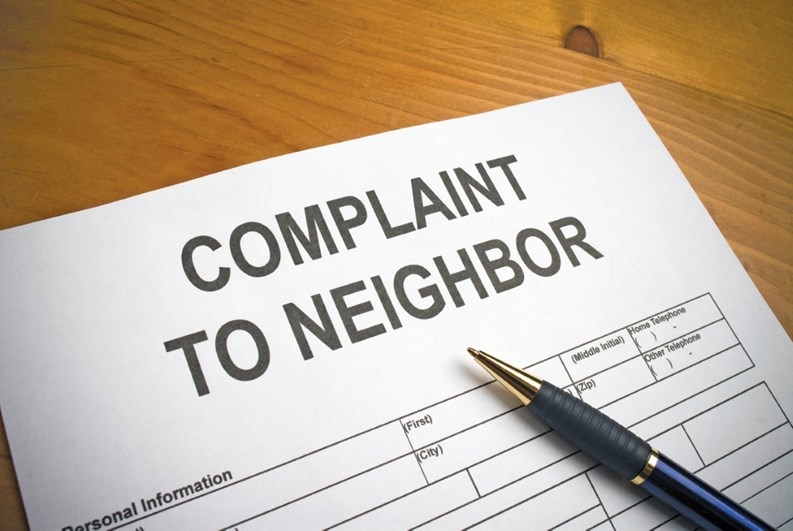Being elected to the condo board inserts a divisive quality into one’s relationship with their neighbors. While still a unit owner, subject to the same rules, regulations and responsibilities, a board member has made a commitment to the larger community. So, when neighbors and friends fail to meet their obligations, flouting the rules or falling behind on condo fees, the board becomes involved. That can inject a dose of stress into any board member’s life.
Starting foreclosure proceedings against the next-door neighbor is perhaps the worst conflict a board member faces, because even while understanding the circumstances in that neighbor’s life, he or she is forced to act.
On a Tightrope
And when neighbors engage in a disputethat involves the board, divisions can reverberate throughout the community. Sometimes, board members feel they’re suspended on a tightrope stretched between condo buildings.
“When people live in the same building, and there’s conflict, it can ruin a friendship, especially if one is serving the dual role of board member and neighbor,” says Josh Hoch, directorof mediation and arbitration services for Mediation Works Inc., in Boston. His firm mediates about 70 condominium disputes a year – about 10 percent of its cases.
There are certain steps to remember before the situation escalates. First, listen. Hoch says those involved in a dispute very often have not even talked to each other about their differences. “People will say, ‘Why didn’t you come to me? Why didn’t you call the board, management?’ We hear a lot of that, over and over. Conflict is inevitable, anda lot of folks don’t have negotiation skills.” This problem is so pervasive that a lot of condominiums have a documented mediation clause, specifying when a negotiator is needed.
Complicating many conflicts is a tendency for board members to have strong friendships – or antagonisms – toward another resident in a conflict. Hoch does not, however, suggest that such a board member step aside immediately. “Try to deal with it internally first,” he says. “Create a time and place to talk privately (with the board member). Be transparent. The board should talk about what they see. Say ‘We notice that when you do this, this is what happens, and that’s no good.’ Talk about what’s exactly going on. Let the board member know we all want this to be a good place for everyone to live, and something’s not working right now. See if folks can work together to try to resolve the conflict.”
Not everyone will cooperate. “Some-times, we find two very positional people who feel they’re right. They bothcare about the building and the other people who live there, but they either have differences of opinion on a topic or they’re not hearing each other.”
There will always be residents who want to play music loud, have guests at off times, make changes to their entrance or rent out their unit, regard-lessof the rules. That’s the tinder for the spark.
Resolutions Possible
Once they’ve talked, either among themselves or through a mediator, resolutions are possible. “Tell the otherperson why the loud music bothers you,” Hoch says. “When they hear, ‘I’m not well and I need sleep,’ or ‘I have a sick child,’ etc., they’re able to understand a little better.”
Sometimes, this is the first time the board and warring sides have talked. “People avoid the conflict altogether,” Hoch said. “That means more problems later. So encourage them to deal with it, rather than avoid it.”
Sometimes, there is combativeness rather than collaboration, he says. “Maybe because people feel they’re on the board, and they have to act immediately. They should try to handle the conflict on their own, as board members, but if they can’t, there are resources available.”
When speaking with a resident, he says, be extra careful to listen. “It’s helpful to both parties if you summarize back what you think you’ve just heard, so that the neighbor can feel heard and acknowledged, and the board members understands clearly.”
There are even courses in negotiations for board members, at such firms as MWI. “We remind them what it’s like to not be on the board, and ask how they’d like to see the conflict dealtwith if they were on the other side.”
Dr. Jasmine Martirossian, lecturer on group dynamics and author of “Decision-Making in Communities: Why Groups of Smart People Some-times Make Bad Decisions,” is an expert on community association dynamics. With the increase in community living, those dynamics have become familiar to more and more people.
“One in six Americans is governed by a community association – that’s profoundly problematic in some ways,” she said. She dubs governing one’s neighbors a role “fraught with complications, involving opportunities to misapply or misinterpret the regulations, or treat them as ‘God’s Code of Laws,’ not meant to be changed – and they are meant to be changed.”
Board Member Training Advised
She advises board members to seek training beforehand. “They’re going to be faced with a number of issues.” These range from neighbors who don’t follow the rules – people one may have played golf with week after week, whosuddenly become the focus of a complaint, or neighbors who complain incessantly to the board.
“None of the rules of human behavior become suspended on condo boards,” she says. “They continue, pretty muchunabated… people don’t realize (on first moving into a governed community) that someone has the power to affect you.”
On the one hand, residents fight particularly hard to protect control over their homes, regardless of which side of the fence they’re on. On the other, though, they may expect the board to be the bad guy. “There’s a tremendous amount of relief for a lot of people in going into a condo, finding out they won’t have to deal with their neighbors, they don’t have to engage in conflict,” she says. That means more baggage for the board. People want their boards to keep the dwelling situation stress-free. “Home is still our most innately cherished place,” she says. “Condominium living is supposed to becarefree living, but board governance can be exhausting,” she says.
Martirossian, too, discovers conflicts of interest causing trouble in board business. “Sometimes, you get a personwith an agenda, or too much time, who gets on the board, and that leads to negative consequences.” That issue is one that board members must face squarely. “To allow an antagonistic person is wrong,” she says. “A board member is supposed to be objective, and boards have to have the sophistication to figure it out.”
The stress can be high enough to dissuade residents from serving. “More than half of the professionals that work with boards refuse to purchase property(there),” Dr. Martirossian says. “A lot of them have seen too many conflicts of interest.”
New board members sometimes dislike admitting to a lack of understanding on an element of the dispute. That’s a key mistake, she says. “Peopleare afraid to ask, for fear of coming across as not knowledgeable. People feel they’re supposed to be.”
In one “extreme situation,” she was asked to negotiate an incident in which there was so much antagonism that board members were being arrested for trespassing. Factions had arisen as well – all over a seemingly innocuous disagreement on a repair. Professional engineers living in the complex wanted to save money and do the repair, while the board president and others were dead set against it. Eventually, she negotiated a compromise: they tried therepair and succeeded, indeed saving the complex several thousand dollars.
“On their own,” she says, “they all came across as rational human beings. But their collective behavior, when theycame together, was most irrational.”
She recommends a gold standard in seeking agreement: cooperation, conciliation, communication and contact.
Failing that, surprise may work. In her negotiations in this matter, a free dinner was thrown into the mix –a reward to the board if the attempt to make repairs failed anyway.
Cooperation is not easy to achieve. “We’re not conditioned to seek help,” Dr. Martirossian says. “We’re raised with social expectations that are cut anddried. Our brains are very efficient; we create shortcuts – stereotypes, for instance – because it’s much easier to deal with life when something is stamped that way.”
Start listening to each other, she suggests.
“Be a little more discerning; listen to a person who may be a little more difficult to listen to. These are friends, colleagues and neighbors, yet we can dismiss the good things they’re saying through that filter we have of them – the stereotype. When you label someone, you’re taking their human character away. That’s a cop-out; it takes courage to listen to and consider their opinion.”
Board members complicate residents’ lives, and their own, by stepping into the role of manager, out of either a desire to help a neighbor or the opposite: to overrule someone he or she dislikes.
David F. Brock, a professional community association manager and principal with Beven & Brock PropertyManagement in Pasadena, Calif., says shifting sands between management and board contributes to friction and board turnover.
Managers Should Contact Owners
“In an ideal world,” he says, “the board should be more behind the scenes, in terms of day-to-day involvement with resolving issues. Manage-mentcompany employees are trained professionals and should be the first point of contact with the owner.”
Of course, that often doesn’t happen.
“In the real world, board members get involved more than they should, and set themselves up to be approached by owners, Brock says. By doing so, board members lose their ability to identify as occupants of the community. They become full-time board members.
Since Beven & Brock mainly manages condominiums averaging 30 units, he says, “We’ll often have a board run by one board member, because of apathy” – an attitude that develops as conflicts pervade a situation or people are busy.
“New board members come in, and think their role is to change things, reshape the board to their view,” Brock says. In the best scenario, though, a property manager is allowed to do his job and the board is consulted when a decision crosses the monetary or situational guidelines set up in the contract. “We should try to be the first line of defense,” he says. “Boards should establish the authority for their executive or manager to handle decisions that don’t go beyond certain spending or governance boundaries.” He’d like to see boards trust their managers more, and micro-manage less, so that the board could do its job, and managers, theirs.
Ann Connery Frantz is a freelance author and a frequent contributor to New England Condominium magazine.










Comments
Leave a Comment